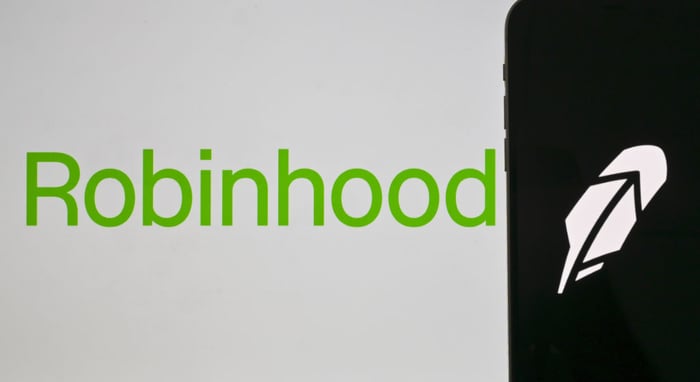|
|
|

|
|||||

|
|
Financial services are one of the most competitive industries you'll see as an investor. Trillions of dollars of wealth circulate through the economy and markets every day.
Robinhood Markets (NASDAQ: HOOD) gained fame as the first brokerage to offer commission-free trades to individuals. Years later, it has continued to grow and has gone from a potential disruptor to an emerging threat to incumbent competitors.
The stock has enjoyed similar success. Robinhood's share price has surged over 250% over the past year. There is still so much opportunity ahead for a company that's still just a fraction of the size of the industry giants it seeks to take business from.
Should investors still buy the stock right now? Here is what you need to know.

Image source: The Motley Fool.
You could say Robinhood's strength lies in its willingness to disrupt a status quo that many of the largest brokerages have enjoyed up until recent years. It gained a foothold in the market with commission-free trades, which ultimately became an industry standard.
Rather than targeting experienced investors who have primarily used incumbent brokerages for years, Robinhood found success by focusing on the younger demographic, marketing itself as a brokerage for new investors. The app has a simple interface, and the company has continually added new products and services over the past few years.
As someone who has used multiple brokerages, I would say that Robinhood is still not as comprehensive a platform as some others, but it's clear that management is building it up. The brokerage now offers individual retirement accounts, a credit card that can funnel rewards back into customers' investment accounts, and a subscription program featuring a variety of perks.
It's working. Robinhood has grown its customer base to 25.9 million with $255 billion in assets across the platform.
Robinhood has become a legitimate player in the brokerage industry. Charles Schwab, one of the industry's most prominent brokerages, has approximately 36.2 million customers, so Robinhood's 25.9 million is nothing to scoff at. The gap between them lies in the assets on each platform. While Schwab's customers keep roughly $10.3 trillion in assets on the platform, Robinhood has just $255 billion, or $9,857 per customer.
Investors will want to see Robinhood's customers keep more assets on the platform over time. There are reasons for optimism, though. For example, Robinhood's younger demographic means that customers generally have less financial assets at this stage of their lives. Assets could flow into Robinhood over time as wealth transfers from older generations to millennials and Gen Z investors.
Additionally, Robinhood could compel customers to consolidate on their platform as they build trust and add new features. Even a quick browse through Reddit will reveal that many Robinhood users have accounts at other brokerages. The company has acted boldly, tackling non-traditional features, such as widespread cryptocurrency listings and prediction markets. These could deter some risk-averse customers, but it's part of the journey of discovering what works for the majority of your customer base.
Time will ultimately tell whether Robinhood can convince enough investors to consolidate on its platform. The company's degree of success in growing its asset base will say a lot about the stock's long-term upside.
The stock's 250% rally has ratcheted up its valuation. Robinhood currently trades at 62 times its 2025 earnings estimates, a steep price tag for a business that analysts estimate will grow earnings at a 13% to 14% annualized rate over the next three to five years.
There is also reason for caution, as Robinhood's business can be volatile. The company depends on transaction-based revenue. Nearly $1.4 billion of Robinhood's $2.95 billion total net revenue last year came from fees associated with cryptocurrency and options trades. Speculative activities such as these tend to dry up during market downturns, so Robinhood's business would likely struggle if investors' risk appetite subsides.
Robinhood's valuation, combined with the market risks inherent in the business model, makes it tough to justify buying the stock at these levels. It's been an excellent run for Robinhood these past 12 months, but investors are probably better off waiting for a pullback before revisiting things here.
Before you buy stock in Robinhood Markets, consider this:
The Motley Fool Stock Advisor analyst team just identified what they believe are the 10 best stocks for investors to buy now… and Robinhood Markets wasn’t one of them. The 10 stocks that made the cut could produce monster returns in the coming years.
Consider when Netflix made this list on December 17, 2004... if you invested $1,000 at the time of our recommendation, you’d have $687,731!* Or when Nvidia made this list on April 15, 2005... if you invested $1,000 at the time of our recommendation, you’d have $945,846!*
Now, it’s worth noting Stock Advisor’s total average return is 818% — a market-crushing outperformance compared to 175% for the S&P 500. Don’t miss out on the latest top 10 list, available when you join Stock Advisor.
*Stock Advisor returns as of June 23, 2025
Charles Schwab is an advertising partner of Motley Fool Money. Justin Pope has no position in any of the stocks mentioned. The Motley Fool recommends Charles Schwab and recommends the following options: short June 2025 $85 calls on Charles Schwab. The Motley Fool has a disclosure policy.
| 6 hours | |
| 8 hours | |
| 9 hours | |
| 10 hours | |
| 12 hours | |
| 12 hours | |
| 12 hours | |
| 13 hours | |
| 14 hours | |
| 14 hours | |
| 18 hours | |
| Feb-17 | |
| Feb-17 | |
| Feb-17 | |
| Feb-17 |
Join thousands of traders who make more informed decisions with our premium features. Real-time quotes, advanced visualizations, backtesting, and much more.
Learn more about FINVIZ*Elite